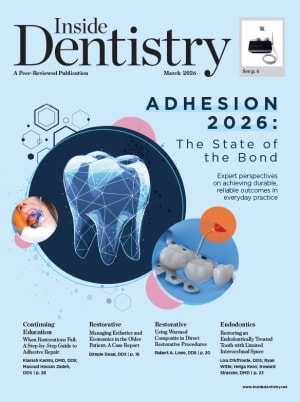Clinicians often have strong opinions about GPs performing treatments that have traditionally been performed by specialists. Some oral surgeons and periodontists firmly believe that GPs shouldn't be placing implants or performing tissue augmentation procedures. However, many have come to accept that GPs can perform these procedures if they receive appropriate education and gain experience. But how much education and experience is sufficient? Endodontics presents a similar conundrum, but it is an entirely different beast. Unlike implant treatment, which serves as an elective alternative to bridges and dentures, endodontic treatment is necessary to save teeth and mitigate potentially life-threatening infections, and having GPs who can perform it is of particular importance in underserved areas with limited or no endodontists.
Our April cover story examines the current state of endodontics in general practice, discusses how GPs should determine which cases they are qualified to treat, and offers recommendations regarding education and technology. As you'll learn in the article, a lot of GPs are performing endodontic treatments. It is imperative that any endodontic treatment provided by a GP meets the standard of care, and it is important to understand that the standard of care for GPs is the same as it is for endodontists. Moreover, the standard of care in endodontics has significantly evolved in recent years. Since I graduated dental school, rotary instrumentation, new irrigation systems, and CBCT imaging have made root canal treatments more efficient, predictable, and successful. To meet the new standard, GPs need modern technology and training in the most current protocols. Fortunately, opportunities for quality education exist, and GPs can practice their new techniques on extracted teeth until they've mastered them. There are even companies who use the CBCT data of teeth with complex or irregular anatomy to produce 3D printed training teeth.
Ultimately, it's important to remember that meeting the standard of care doesn't just include the treatment itself; it also includes being able to effectively manage any adverse events or postoperative complications that may arise. Making mistakes and dumping them on your endodontist is a surefire way to ruin your relationship with him or her—and your patients!
Robert C. Margeas, DDS
Editor-in-Chief, Inside Dentistry
Private Practice, Des Moines, Iowa
Adjunct Professor
Department of Operative Dentistry
University of Iowa, Iowa City, Iowa
robert.margeas@broadcastmed.com
